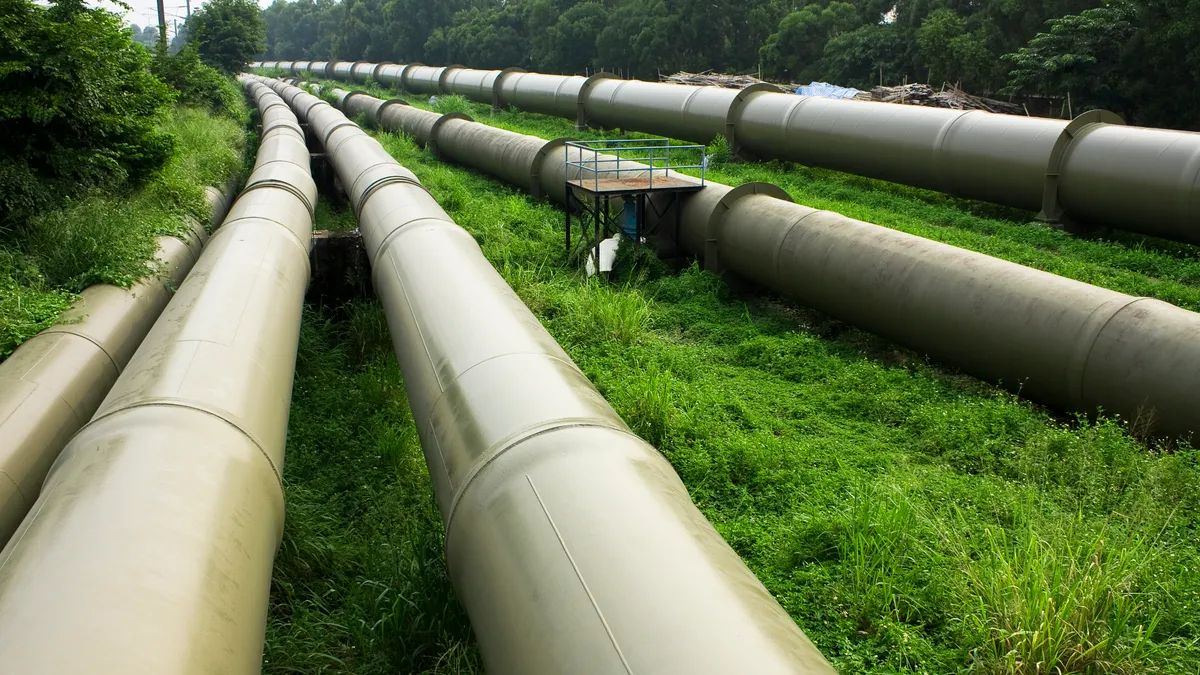Dive Brief:
- A new report produced by staff of the New Hampshire Public Utilities Commission finds electric utilities may legally purchase gas pipeline capacity, a determination that could help bolster supplies in the region.
- The report was prepared at the request of Eversource Energy and National Grid, two of the state's electric utilities that have partnered with pipeline developer Spectra to propose upgrades to a line that runs through Eastern Massachusetts, New Hampshire Public Radio reports.
- Though gas remains inexpensive, pipeline capacity constraints during the New England winter help contribute to higher electricity prices, pushing utilities to find ways to stabilize fuel prices. Regulators wrote that purchasing pipeline capacity could be legal for utilities already, as long as it is used to lower prices.
Dive Insight:
Electric utilities in gas-reliant regions are increasingly seeking to invest directly in the production and transportation of the resource, hoping to hedge against supply fluctuations or — in this case — transportation constraints that can drive up prices.
In New Hampshire, the state's two dominant IOUs asked regulators back in February to evaluate the legality of electric utilities using ratepayer dollars to buy space on gas pipelines.
This week, the PUC responded with a report indicating that utilities may already have that authority, as long as the purchases are made with the expressed purpose of lowering prices. It's a decision that could help clear the way for power companies to back a handful of pipeline projects being considered for the region.
"From a legal perspective," staff said in the report it believed the commission could hold that New Hampshire utilities "have authority to enter into gas capacity contracts for the benefit of gasfiredcgenerators."
Two pipelines, Access Northeast and Portland Natural Gas Transmission System, have proposed expanding their New England systems and a third, Northeast Energy Direct, would be a new system running through Massachusetts and New Hampshire. All of the systems would deliver significant volumes of gas supplies to New England from the Marcellus Shale in Northeastern Pennsylvania.
The new capacity is needed, pipeline advocates argue, due to winter price spikes in gas prices in New England and the expectation that gas prices will rise for the region in the future.
ICF International told the commission that prices for New England states could reach $23/MMBtu by 2028 as gas reliance grows and imports slow from Canada. And in Massachusetts, National Grid asked regulators this week for a 21% rate hike to cover the cost of gas capacity constraints this winter.
Allowing electric utilities to make direct investments in natural gas appears to be a growing trend, though many are cautious about the risk it puts onto ratepayers.
“I think it’s enormously difficult to do the type that the staff report assumes can be done,” New England Power Generators President Dan Dolan told New Hampshire Public Radio. He said if utilities guess wrong about their gas needs, bad investments could leave customers with higher bills.
Environmental groups are concerned also, wishing to see more emphasis on efficiency and demand response rather than an expansion of fossil fuel infrastructure.
Florida regulators have allowed electric utilities to invest in gas field development, but so far that decision is showing dubious results. Florida Power & Light's plan to invest in Oklahoma shale gas wells cost ratepayers almost $6 million so far this year, and other utilities are considering similar investments.














